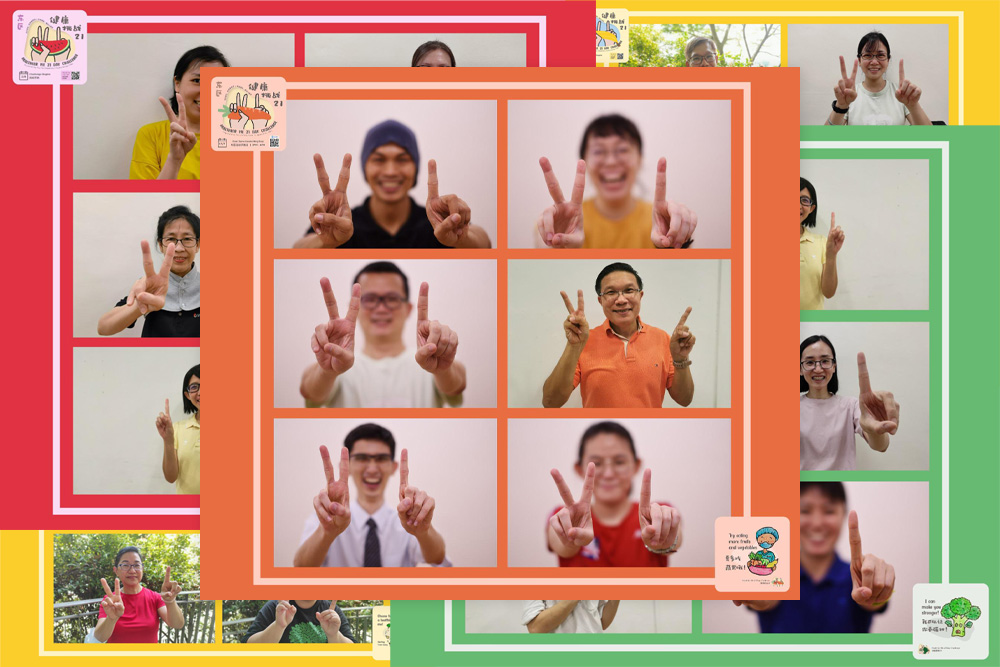 (Photo by Fong Kwai Kin)
(Photo by Fong Kwai Kin)
The Tzu Chi Recycling Day in March this year kicked off to a rousing start, with the active participation of close to 200 students from Hwa Chong Institution in eight Tzu Chi recycling points. The youths rolled up their sleeves to work alongside recycling volunteers and learn how to sort through the myriad recyclables.
Before the commencement of the recycling activity, Tzu Chi volunteers shared with the students the “Seven Objectives of Environmental Protection” (“环保七化”) as well as the “Ten-Finger Mnemonic” (“环保十指口诀”), a formula for remembering different types of recyclables. They also introduced Tzu Chi’s concept of environmental protection and its origins, and led the students in an energetic bout of exercise, bringing much joy and laughter to everyone present.
Seven Objectives of Environmental Protection
|
 (Photo by Fong Kwai Kin)
(Photo by Fong Kwai Kin)
These students are no stranger to the concept of environmental protection and loving our planet. But for many of the students, it was their first hands-on experience of sorting and packing recyclables.
Bai Hao Xuan (middle in the picture below), who was assigned to the “newspapers and books” section, said while trying to bundle up a pile of old books: “I constantly get the nagging feeling that I can’t even bundle up the books properly together and they look rather untidy. There are really many more lessons to be learned in life!”
Hao Xuan further shared that although he knew the importance of environmental protection, he had never taken it seriously personally. After witnessing many older folks busy at work in Tzu Chi’s recycling point, he said, “I’d feel ashamed if I didn’t do it myself, too!”
Bai Hao Xuan also made personal promises to himself: Starting from this day, he would cut down on use of drinking straws, bring his own water bottle, use reusable containers for takeaway food and refuse the use of disposable tableware.
 (Photo by Joseph Lim)
(Photo by Joseph Lim)
“There are more newspapers over here. (The trolley) is already overladen; let’s make another trip here!”
As some families were unable to bring the items downstairs by themselves, the students divided themselves into teams to visit individual households to collect recyclables, such as newspapers, clothes, cans, carton boxes, etc. The youths were not afraid of dirtying themselves, and did not feel tired even after making a few trips to and fro between the households and the recycling point.
 (Photo by Huang Bo Han)
(Photo by Huang Bo Han)
 (Photo by Huang Bo Han)
(Photo by Huang Bo Han)
“Even paper has to be sorted meticulously. The small plastic window on an envelope has to be torn off, too,” said a surprised Zheng Jia En (second from the left in the picture below).
Although her family does recycling at home, she did not know that the sorting work has to be done in such a detailed way. So she intended to share what she had learned with her family and planned to volunteer at the recycling point again in the following month.
 (Photo by Ani)
(Photo by Ani)
Another student, Chen Yun Hong, whose attire was soaked with perspiration, remarked that although people generated a lot of trash, most were still clueless about the impact of their actions. She added that Master Cheng Yen’s appeal for everyone to “use their applauding hands to do recycling” really makes sense; the only thing was most people did not know enough about environmental protection. She planned to share her newfound knowledge of the topic with other schoolmates and personally involve herself in recycling work.
Another student, Pan Yi lin (first from the left in the picture below), learned that not all used clothes can be recycled; for instance, socks and inner garments cannot be collected for recycling due to hygiene concerns.
“I feel that recycling requires a lot of manpower, and doing recycling within communities encourages participation by more residents. Taking part in today’s recycling activity has deepened our concept of environmental protection and serves as a good reminder for all of us to generate less trash,” said Pan.
 (Photo by Fong Kwai Kin)
(Photo by Fong Kwai Kin)
When the day’s activity finally drew to a close, the students sat down to share their experiences. One of them commented that people should cut down on material wants and buy fewer things, while another said that they should remind each other to cut down on spending. In fact, everyone shared a common ground: environment protection is not just an empty slogan, but is realised through concrete actions!



